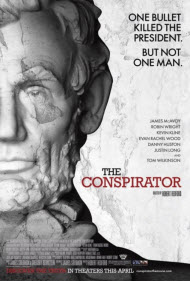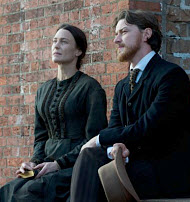The Conspirator
 for some violent content.
for some violent content.
Reviewed by: Thaisha Geiger
CONTRIBUTOR
| Moral Rating: | Better than Average |
| Moviemaking Quality: |
|
| Primary Audience: | Teens Adults |
| Genre: | History Drama |
| Length: | 2 hr. 3 min. |
| Year of Release: | 2011 |
| USA Release: |
April 15, 2011 (wide—550+ theaters) DVD: August 16, 2011 |












murder in the Bible
anger in the Bible
REVENGE, love replaces hatred—former Israeli soldier and an ex-PLO fighter prove peace is possible-but only with Jesus Christ
| Featuring |
|---|
|
Evan Rachel Wood … Anna Surratt James McAvoy … Frederick Aiken Alexis Bledel … Sarah Weston Robin Wright Penn … Mary Surratt Justin Long … Nicholas Baker Danny Huston … Joseph Holt Norman Reedus … Lewis Payne Kevin Kline … Edwin Stanton Tom Wilkinson … Reverdy Johnson Jonathan Groff … Louis Weichmann Stephen Root … John Lloyd Toby Kebbell … John Wilkes Booth James Badge Dale … William Hamilton Colm Meaney … David Hunter Shea Whigham … Capt. Cottingham See all » |
| Director |
|
Robert Redford |
| Producer |
|
American Film Company, The Wildwood Enterprises Jeremiah Samuels … executive producer Brian Peter Falk … producer See all » |
| Distributor |
“One bullet killed the President. But not one man.”

It’s been 150 years since the Civil War and the first assassination of a president. Though John Wilkes Booth is almost universally known for pulling the trigger, he was part of a much larger conspirator circle, involving several other members and several other attempted assassinations. The only woman to be tried for conspiracy was Mary Surratt.
The U.S. Constitution requires a person to have a jury of their peers. Since Mrs. Surratt’s case took place within the last few ripples of the Civil War, she was tried in a military tribunal of high-ranking Union officials. Of course, this turned out to be incredibly biased and screamed of an unfair trial. Adding to that was the corruption of the prosecutor. Not only did he personally select the members of the tribunals, he was also guilty of witness tampering and intimidation (Proverbs 17:23). Unfair overrulings also worked against Ms. Surratt as she was forbidden of testifying in her own defense. The Union officials had only one goal in mind: swift justice.
Those looking to learn more about the life and detailed trial of Mary Surratt (Robin Wright Penn) will likely be disappointed. Though the bulk of the film consists of tribunal proceedings and flashbacks, the film’s main objective is not to persuade the viewer of Mary’s guilt or innocence. No, it is to show regardless of her innocence, she was denied a fair trial which is guaranteed in the most important document of the U.S. government: the Constitution. In fact, Mary’s character remains more aloof than anything. Robin Wright gives one of her fiercest and most gentle performances to date. A seeming oxymoron, at first glance, Wright gives the character of Surratt enough emotion and conviction to display a devoted mother who, though facing the death penalty, refuses to give up her son, who had been more of a front runner in the Lincoln assassination.
Defending her is Frederick Aiken (James McAvoy). A celebrated Union soldier, Mr. Aiken was understandably aghast at having to defend a Confederate sympathizer. His disgust with her convictions was soon wisely set aside when he decided to uphold his oath as a lawyer (Ephesians 4:31). Regardless of her actions, Frederick rightfully defended his client, despite his being ostracized, mocked, and warned (Psalm 106:3; Prov. 21:3). In spite of all this, he remains steadfast in providing justice for his client. Likewise, Jesus proclaimed his sovereignty and lordship, despite his being mocked and turned against. His followers are required to do the same in Luke 9:23-24:
“…‘If anyone would come after me, he must deny himself and take up his cross daily and follow me. For whoever wants to save his life will lose it, but whoever loses his life for me will save it.’”
Refreshingly, there isn’t any sexual content in “The Conspirator.” Two characters do kiss, but it’s sweet. In all, there are about 11 uses of profanity, including 1 SOB, 1 sh*t, 1 hell, and 6 d*mn. Though two of the latter were used correctly in saying someone was damned. God’s name is misused twice. Some social drinking takes place, but no one is shown drunk. The violence is moderate, but it’s neither overly graphic. Lincoln is shown being shot up close, but the wound is not shown. One man stabs a guard and then jumps on top of another and repeatedly stabs him. Hangings are shown. Though the victims are not shown slowly dying, one can hear when the rope disturbingly tightens as the bodies fall. Some wounded soldiers are shown in the opening scenes and have bloody faces. However, this is a very mild scene.
The film displays a good number of historical accuracies. However, I felt that perhaps Frederick Aiken was portrayed as a bit too overly heroic. Little is known of him, and research shows that he did have his inadequacies when defending Ms. Surratt. The film has a heavy, consistent motif of the government conveniently skipping the rights of the Constitution, whenever they deem fit. Perhaps some might consider this to be a modern commentary, as well. If you’re into history, like I am, then I recommend this film. It mentions some constitutional vocabulary which had me wanting to delve deeper. However, if history does not overly interest you, then you might find this film boring.
Violence: Moderate / Profanity: Moderate / Sex/Nudity: None
See list of Relevant Issues—questions-and-answers.


Moral rating: Good / Moviemaking quality: 5
none
Moral rating: Very Offensive / Moviemaking quality: 3
This is true in so many situations: our day-to-day dealings with each other, and our large scale interactions as a community, a country. This movie made my blood boil because of the injustice that Mrs. Surratt faced. To us watching it today, the injustice seems so obvious, but to the people living then the lines were blurred by their want for vengeance. I do not know the historical particulars surrounding Mrs. Surratt’s trial, but the film was moving, fueled by James McAvoy’s ever splendid performance and the vivid historical setting.
In the end, this movie is a wonderful, emotional lesson to follow the laws of justice even in the face of opposition, whether that opposition comes from outside… or from inside your own heart.
Moral rating: Excellent! / Moviemaking quality: 4

The film is noble and right as it shows a former Union officer learning to show forgiveness and mercy to a former enemy. It shows a wonderful example of sacrificial motherhood, which is refreshing in a day when Hollywood is always attacking parents.
I was not only touched at this example of a loving mother, but also at the spiritual analogy. Mary Surratt’s willingness to lay down her live for that of her guilty son reminded me of how Christ was willing to lay down his life for his guilty children. Fredrick Aiken’s bravery in standing for right in the face of political and social pressure is inspiring.
Objectionable content: There were about 5 ds, a sh—,and maybe a few other bad words. When a priest says he obeys God’s Word above man’s, the main character replies that the Bible has many interpretations. There were a few violent parts dealing with the assassination and the hanging, but they were rather tame compared to most PG-13 movies out there. There was also drinking. Mary Surratt’s faith is shown in making her a strong woman in the face of death. At one point, she and the main character quote the Proverbs.
Again, the themes of forgiveness, mercy, motherly love, and doing the right thing in the face of impregnable opposition make this film highly recommendable. Any historian of the Civil War will be able to make connections between the discard for constitutional rights and civil liberties from that era and the troubles today as large government trumps individual rights. A film like “The Conspirator” can help inspire us to stand against injustice. Go see this movie!
My Ratings: Moral rating: Better than Average / Moviemaking quality: 4